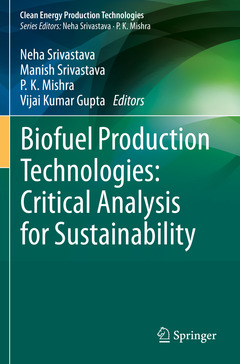Biofuel Production Technologies: Critical Analysis for Sustainability, 1st ed. 2020 Clean Energy Production Technologies Series
Coordonnateurs : Srivastava Neha, Srivastava Manish, Mishra P. K., Gupta Vijai Kumar

Production and utilization of sustainable energy toward maintaining a clean environment is a major challenge. At the same time, the continued depletion of fossil fuels and the global dependency on non-renewable fuels is a chief concern. Moreover, the long-term economic and environmental issues associated with the high utilization of fossil fuel, such as global warming, are also important, particularly in the context of the predicted increase in the global population to around 5 billion by 2050.
In recent years, researchers have been investigating alternative, renewable fuels to replace fossil fuels. Of the various options, biofuels are especially attractive due to their low production costs and the fact that they are pollution free. Also known as transportation fuels, their energy is derived from biological resources or through the biological processes. Biofuels such as biohydrogen, biomethane, biogas, ethanol and butanol offer a number of advantages and can be economically produced from cellulosic biomass. As such, they can play a vital role in sustainably meeting future energy demands.
Biofuels have the potential to become a global primary energy source, offering significant reductions in greenhouse gas emissions as well as opportunities to increase economic and social development in rural communities and reduce the problems associated with waste disposal. However, low yields and lack of process technology are some of the aspects that need to be addressed.
This book offers an overview of existing biofuels and the technologies to solve the problems associated with their practical implementation. Evaluating the biofuel options and discussing the opportunities and risks in relation to resources, technologies, practices, markets and policy, it provides insights into the development of economically viable bioenergy industries.
Chapter-1 Biofuels: types and process overview.- Chapter-2 Biofuels generation based on technical process and biomass quality.- Chapter-3 Biogas: An Effective and Common Energy Tool-PART-I.- Chapter-4 Biogas: An Effective and Common Energy Tool-PART-II.- Chapter-5 Biogas: An Effective and Common Energy Tool-PART-III.- Chapter-6 Stoichiometric analysis of biogas production from industrial residues.- Chapter-7 Bioethanol Production; Generation Based Comparative Status Measurements.- Chapter-8 Algal Biomass: Potential Renewable Feedstock for Biofuels Production-PART-I.- Chapter-9 Recent trends in biogas upgrading technologies for biomethane production.- Chapter-10 Efficiency Analysis of Crude Vs Pure Cellulase in Industry.- Chapter-11 Significance of process parameters on fungal cellulase production.- Chapter-12 Modeling and stimulation of pyrolysis of teak (Tectona grandis) Sawdust.
Dr. Neha Srivastava
Neha Srivastava is currently working as Post-doctorate fellow in Department of Chemical Engineering and Technology, IIT (BHU) Varanasi, India. She has published 25 research articles in the in peer reviewed journals with 03 patents and have 01 Technology Transfer. She has been completed her PhD from Department of Molecular and Cellular Engineering, SHIATS, India in 2016 in the area of bioenergy. She has been received 06 Young Scientist Awards. Presently, she is working on biofuels production (Cellulase enzymes; production and enhancement, biohydrogen production from waste biomass, bioethanol production). Field of Expertise: Biofuels production, microbial bioprocessing and enzyme technologies
Dr. Manish Srivastava
Manish Srivastava is working as DST INSPIRE faculty in the Department of Physics and Astrophysics, University of Delhi, India. He has published 45 research articles in the in peer reviewed journals, authoredseveral book chapters and filed 1 patent. He worked as a post doctorate fellow in the Department of BIN Fusion Technology, Chonbuk National University from August 2012 to August 2013. He was an Assistant Professor in the Department of Physics, DIT School of Engineering, Greater Noida, from July 2011 to July 2012. He received his Ph. D. in Physics from the Motilal Nehru National Institute of Technology, Allahabad, India in 2011. Presently, he is working on the synthesis of graphene based metal oxide hybrids and their applications as catalysts. His area of interest is synthesis of nanostsructured materials and their applications as catalyst for development of electrode materials in energy storage, biosensors and biofuels production. Field of Expertise: Synthesis of nanomaterials and their application as catalyst for development of electrode materials in energy storage, biosensors and biofules productions.Professor P.K. Mishra
P. K.Mishra is
Date de parution : 08-2021
Ouvrage de 342 p.
15.5x23.5 cm
Date de parution : 03-2020
Ouvrage de 342 p.
15.5x23.5 cm
Thèmes de Biofuel Production Technologies: Critical Analysis for... :
Mots-clés :
Biomass; Biofuels; Biohydrogen; Bioethanol; Fermentable sugar



